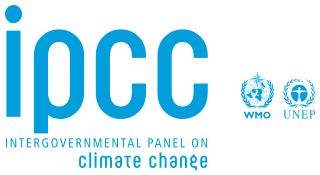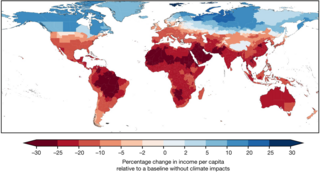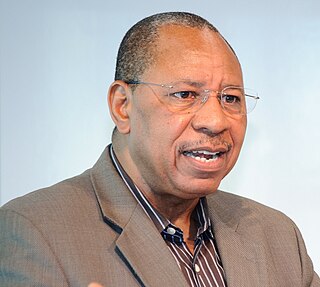Related Research Articles

The Intergovernmental Panel on Climate Change (IPCC) is an intergovernmental body of the United Nations. Its job is to advance scientific knowledge about climate change caused by human activities. The World Meteorological Organization (WMO) and the United Nations Environment Programme (UNEP) set up the IPCC in 1988. The United Nations endorsed the creation of the IPCC later that year. It has a secretariat in Geneva, Switzerland, hosted by the WMO. It has 195 member states who govern the IPCC. The member states elect a bureau of scientists to serve through an assessment cycle. A cycle is usually six to seven years. The bureau selects experts in their fields to prepare IPCC reports. There is a formal nomination process by governments and observer organizations to find these experts. The IPCC has three working groups and a task force, which carry out its scientific work.

Economic analysis of climate change is about using economic tools and models to calculate the magnitude and distribution of damages caused by climate change. It can also give guidance for the best policies for mitigation and adaptation to climate change from an economic perspective. There are many economic models and frameworks. For example, in a cost–benefit analysis, the trade offs between climate change impacts, adaptation, and mitigation are made explicit. For this kind of analysis, integrated assessment models (IAMs) are useful. Those models link main features of society and economy with the biosphere and atmosphere into one modelling framework. The total economic impacts from climate change are difficult to estimate. In general, they increase the more the global surface temperature increases.

Climate change adaptation is the process of adjusting to the effects of climate change. These can be both current or expected impacts. Adaptation aims to moderate or avoid harm for people, and is usually done alongside climate change mitigation. It also aims to exploit opportunities. Humans may also intervene to help adjustment for natural systems. There are many adaptation strategies or options. They can help manage impacts and risks to people and nature. The four types of adaptation actions are infrastructural, institutional, behavioural and nature-based options.
Michael Oppenheimer is the Albert G. Milbank Professor of Geosciences and International Affairs in the Princeton School of Public and International Affairs, the Department of Geosciences, and the High Meadows Environmental Institute at Princeton University. He is the director of the Center for Policy Research on Energy and the Environment (C-PREE) at the Princeton School of Public and International Affairs and Faculty Associate of the Atmospheric and Ocean Sciences Program and the Princeton Institute for International and Regional Studies.
Climate risk is the potential for problems for societies or ecosystems from the impacts of climate change. The assessment of climate risk is based on formal analysis of the consequences, likelihoods and responses to these impacts. Societal constraints can also shape adaptation options. There are different values and preferences around risk, resulting in differences of risk perception.

Roger S. Pulwarty is a scientist from Trinidad and Tobago and contributed to the work of the Intergovernmental Panel on Climate Change (IPCC). Pulwarty is the Senior Scientist in the National Oceanic and Atmospheric Administration (NOAA) Physical Sciences Laboratory in Boulder, Colorado.

The Fifth Assessment Report (AR5) of the United Nations Intergovernmental Panel on Climate Change (IPCC) is the fifth in a series of such reports and was completed in 2014. As had been the case in the past, the outline of the AR5 was developed through a scoping process which involved climate change experts from all relevant disciplines and users of IPCC reports, in particular representatives from governments. Governments and organizations involved in the Fourth Report were asked to submit comments and observations in writing with the submissions analysed by the panel. Projections in AR5 are based on "Representative Concentration Pathways" (RCPs). The RCPs are consistent with a wide range of possible changes in future anthropogenic greenhouse gas emissions. Projected changes in global mean surface temperature and sea level are given in the main RCP article.

Saleemul Huq was a Bangladeshi-British scientist and had been the Director of the International Centre for Climate Change & Development (ICCCAD) based in Bangladesh, also Professor at Independent University, Bangladesh (IUB). He was elected one of Nature's 10 top scientists in 2022.

Climate change and poverty are deeply intertwined because climate change disproportionally affects poor people in low-income communities and developing countries around the world. The impoverished have a higher chance of experiencing the ill-effects of climate change due to the increased exposure and vulnerability. Vulnerability represents the degree to which a system is susceptible to, or unable to cope with, adverse effects of climate change including climate variability and extremes.
The Bjerknes Centre for Climate Research is a climate research centre in Bergen, Norway. The centres key areas of research is natural variability in the Earth system and man-made climate change. The centre combines observations with theoretical and modelling studies of past, present and future climates. Both Global and Polar regions are studied.
Climate resilience is a concept to describe how well people or ecosystems are prepared to bounce back from certain climate hazard events. The formal definition of the term is the "capacity of social, economic and ecosystems to cope with a hazardous event or trend or disturbance". For example, climate resilience can be the ability to recover from climate-related shocks such as floods and droughts. Methods of coping include suitable responses to maintain relevant functions of societies and ecosystems. To increase climate resilience means one has to reduce the climate vulnerability of people and countries. Efforts to increase climate resilience include a range of social, economic, technological, and political strategies. They have to be implemented at all scales of society, from local community action all the way to global treaties.

Lindsay C. Stringer is a Professor in Environment and Development at the University of York.

The contributions of women in climate change have received increasing attention in the early 21st century. Feedback from women and the issues faced by women have been described as "imperative" by the United Nations and "critical" by the Population Reference Bureau. A report by the World Health Organization concluded that incorporating gender-based analysis would "provide more effective climate change mitigation and adaptation."

Sonia Isabelle Seneviratne is a Swiss climate scientist, professor at the Institute for Atmospheric and Climate Science of the ETH Zurich. She is a specialist of extreme climate events.

Sustainable Development Goal 13 is to limit and adapt to climate change. It is one of 17 Sustainable Development Goals established by the United Nations General Assembly in 2015. The official mission statement of this goal is to "Take urgent action to combat climate change and its impacts". SDG 13 and SDG 7 on clean energy are closely related and complementary.

The Sixth Assessment Report (AR6) of the United Nations (UN) Intergovernmental Panel on Climate Change (IPCC) is the sixth in a series of reports which assess the available scientific information on climate change. Three Working Groups covered the following topics: The Physical Science Basis (WGI); Impacts, Adaptation and Vulnerability (WGII); Mitigation of Climate Change (WGIII). Of these, the first study was published in 2021, the second report February 2022, and the third in April 2022. The final synthesis report was finished in March 2023.

Climate change vulnerability is a concept that describes how strongly people or ecosystems are likely to be affected by climate change. Its formal definition is the "propensity or predisposition to be adversely affected" by climate change. It can apply to humans and also to natural systems. Issues around the capacity to cope and adapt are also part of this concept. Vulnerability is a component of climate risk. Vulnerability differs within communities and also across societies, regions, and countries. It can increase or decrease over time.

Opha Pauline Dube is a Botswanan environmental scientist and Associate Professor in the Department of Environmental Science at the University of Botswana. She co-authored the IPCC's Special Report on Global Warming of 1.5 °C. She is one of fifteen scientists creating the 2023 Global Sustainable Development Report for the United Nations.
Coleen Vogel is a South African climatologist involved in international work on climate change. She is a Distinguished Professor at the University of the Witwatersrand. In 2009 she was the third winner of the Burtoni Award for her work.

Youba SokonaFAAS FTWAS (born 23 May 1950) is a Malian expert in the fields of energy and sustainable development, particularly in Africa. He has been the vice-chair of the Intergovernmental Panel on Climate Change (IPCC) since October 2015 and a lead author at the IPCC since 1990.
References
- 1 2 3 4 5 6 7 "Richard Klein recognized for 'outstanding contributions' to adaptation science". SEI. Retrieved 2022-12-15.
- ↑ "Prof. Coleen Vogel". WIOMSA. Retrieved 2022-12-15.
- ↑ "Community Based Adaptation to Climate Change Bulletin - SECOND INTERNATIONAL WORKSHOP ON COMMUNITY-BASED ADAPTATION TO CLIMATE CHANGE - 24-28 FEBRUARY 2007". Archived from the original on 2012-05-09. Retrieved 2007-07-23.
- ↑ Press release: "070228Saleem". Archived from the original on 2007-09-27. Retrieved 2007-07-23.
- ↑ South African researcher takes top climate change award Archived May 27, 2012, at the Wayback Machine National Climate Change Adaptation Research Facility, 30 June 2010
- ↑ "Stéphane Hallegatte - Senior Climate Change Adviser".